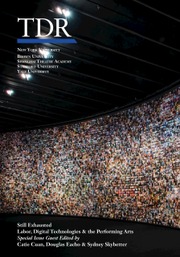No CrossRef data available.
Article contents
Joe Arroyo’s “Musical Mechanism”
Solidarity and Redemption in an Afro-Caribbean Carnival Song
Published online by Cambridge University Press: 05 September 2025
Abstract
Joe Arroyo’s music, specifi cally his carnival compositions, generates modes of solidarity that transcend national and temporal boundaries. His “musical mechanism,” employing the clave rhythm and improvisational structures, facilitates a collective reinhabitation of the past, a redemptive challenging of colonial divisions between the living and the dead. Arroyo’s work, therefore, demonstrates the transformative power of music to forge solidarity across carnival participants.
Information
- Type
- Article
- Information
- TDR , Volume 69 , Issue 3: Performance, Possession, and Automation Brown University TDR Consortium Issue , September 2025 , pp. 36 - 52
- Copyright
- © The Author(s), 2025. Published by Cambridge University Press on behalf of New York University Tisch School of the Arts
References
References
Morales, Abadía, Guillermo. (1970) 1983. Compendio General del Folklore Colombiano. Vol. 112. Biblioteca Banco Popular.Google Scholar
Arroyo, Joe (Alvaro José). 1985. “Serafín del Pecado.” In Me le fugué a la candela. Discos Fuente.
Google Scholar
Audiovisuales, Ministerio de Cultura de Colombia. 1966. “Vida y obra del compositor y cantante de música bailable Joe Arroyo.” Audiovisuales.Google Scholar
Barcia Zequeira, María del Carmen, Rodríguez Reyes, Andrés, and Niebla Delgado, Milagros. 2012. Del Cabildo de “Nación” a la Casa de Santo. Fundación Fernando Ortíz.Google Scholar
Benítez-Rojo, Antonio. (1992) 1996. The Repeating Island: The Caribbean and the Postmodern Perspective. Trans. James, E. Maraniss. 2nd ed. Duke University Press.Google Scholar
Brathwaite, Kamau. 1974. Contradictory Omens: Cultural Diversity and Integration in the Caribbean. Monograph #1. Savacou Publications.Google Scholar
Carnegie, Charles V. 2002. Postnationalism Prefigured: Caribbean Borderlands. Rutgers University Press.Google Scholar
Chambers-Letson, Joshua. 2018. After the Party: A Manifesto for a Queer of Color Life. New York University Press.Google Scholar
Childs, Matt D. 2006. The 1812 Aponte Rebellion in Cuba and the Struggle against Atlantic Slavery. University of North Carolina Press.Google Scholar
Díaz, Adriana. 2021. “Joe Arroyo, el rockstar del Caribe colombiano.” Radionica, 26 July. www.radionica.rocks/musica/musica-colombiana/joe-arroyo-el-rockstar-del-caribe-colombiano
Google Scholar
Diawara, Manthia. 2011. “One World in Relation: Édouard Glissant in Conversation with Manthia Diawara.” Nka: Journal of Contemporary African Art 28:4–19. doi.org/10.1215/10757163-1266639
CrossRefGoogle Scholar
Dubois, Dominique. 2002. “The Redemptive Power of Bone’s Revisionary Fiction.” In Theatre of the Arts: Wilson Harris and the Caribbean, ed. Maes-Jelinek, Hena and Ledent, Bénédicte, 195–204. Brill.Google Scholar
Fundación Ernesto McCausland. (1989) 2020. “Joe Arroyo en el estudio de grabación.” Ed. Ernesto McCausland. YouTube, 16 February. youtu.be/XB1kYYaEOXk?si=7nm6nGgLegc98-qr
Google Scholar
Glissant, Édouard. (1990) 2010. Poetics of Relation. Trans. Wing, Betsy. University of Michigan Press.Google Scholar
Grewe, Oliver, Kopiez, Reinhard, and Altenmüller, Eckart. 2009. “The Chill Parameter: Goose Bumps and Shivers as Promising Measures in Emotion Research.” Music Perception 27, 1:61–74. doi.org/10.1525/mp.2009.27.1.61
CrossRefGoogle Scholar
Habermas, Jürgen. 1979. “Consciousness-Raising or Redemptive Criticism: The Contemporaneity of Walter Benjamin.” New German Critique 17:30–59. doi.org/10.2307/488008
CrossRefGoogle Scholar
Harris, Wilson. 1999. Selected Essays of Wilson Harris: The Unfinished Genesis of the Imagination. Ed. Andrew Bundy. Routledge.Google Scholar
James, C.L.R. 1965. Wilson Harris: A Philosophical Approach. General public lecture series: West Indian Literature. University of the West Indies.Google Scholar
Lechner, Ernesto. 2024. “The 50 Greatest Salsa Albums of All Time: Six Decades of Classics, from Boogaloo to Salsa Romántica and Beyond.” Rolling Stone, 30 October. www.rollingstone.com/music/music-lists/best-salsa-albums-1235139298/
Google Scholar
Mackey, Nathaniel. 1980. “Limbo, Dislocation, Phantom Limb: Wilson Harris and the Caribbean Occasion.” Criticism 22, 1:57–76. www.jstor.org/stable/23103186
Google Scholar
Mackey, Nathaniel. 1993. Discrepant Engagement: Dissonance, Cross-Culturality, and Experimental Writing. Cambridge University Press.Google Scholar
Mbembe, Achille. 2005. “Variations on the Beautiful in the Congolese World of Sounds.” Politique Africaine 4:69–91. doi.org/10.3917/polaf.100.0069
CrossRefGoogle Scholar
McKittrick, Katherine. 2014. “Mathematics Black Life.” The Black Scholar 44, 2:16–28. doi.org/10.1080/00064246.2014.11413684
CrossRefGoogle Scholar
Moten, Fred. 2018. The Universal Machine: Consent Not to Be a Single Being. Duke University Press.Google Scholar
Moten, Fred. 2022. “Fred Moten Lecture.” Lecture presented at the Visiting Artists Program Lecture Series, School of the Art Institute of Chicago.Google Scholar
Ortiz, Fernando. (1952) 1984. La Clave Xilofónica de la Música Cubana: Ensayo Etnográfico. Editorial Letras Cubanas.Google Scholar
Panksepp, Jaak. 1995. “The Emotional Sources of ‘Chills’ Induced by Music.” Music Perception 13, 2:171–207. doi.org/10.2307/40285693
CrossRefGoogle Scholar
Herencia, Quintero, Carlos, Juan. 2004. La máquina de la salsa: tránsitos del sabor. 1st ed. Colección Caida libre. Ediciones Vértigo.Google Scholar
Sachs, Matthew E., Ellis, Robert J., Schlaug, Gottfried, and Loui, Psyche. 2016. “Brain Connectivity Reflects Human Aesthetic Responses to Music.” Social Cognitive and Affective Neuroscience 11, 6:884–91. doi.org/10.1093/scan/nsw009
CrossRefGoogle ScholarPubMed
Sawyer, Mark Q. 2005. “Du Bois’s Double Consciousness versus Latin American Exceptionalism: Joe Arroyo, Salsa, and Negritude.” Souls 7, 3–4:85–95. doi.org/10.1080/10999940500265516
CrossRefGoogle Scholar
Schneider, Rebecca. 2011. Performing Remains: Art and War in Times of Theatrical Reenactment. Routledge.Google Scholar
Guzman, Silva, Mauricio. 2008. El Centurión de la Noche: Joe Arroyo, una Vida Cantada. Editorial La Iguana Ciega Barranquilla.Google Scholar
Spade, Dean. 2020. “Solidarity Not Charity: Mutual Aid for Mobilization and Survival.” Social Text 38, 1:131–51. doi.org/10.1215/01642472-7971139
CrossRefGoogle Scholar
Spillers, Hortense J. 1987. “Mama’s Baby, Papa’s Maybe: An American Grammar Book.” Diacritics 17, 2:64–81. www.jstor.org/stable/464747
10.2307/464747CrossRefGoogle Scholar
Tancons, Claire. 2015. “Farewell, Farewell: Carnival, Performance, and Exhibition in the Circum-Atlantic Economy of the Flesh.” In En Mas’: Carnival and Performance Art of the Caribbean, ed. Claire Tancons and Krista Thompson, 14–29. Independent Curators International (ICI).Google Scholar
Taylor, Diana. 2003. The Archive and the Repertoire: Performing Cultural Memory in the Americas. Duke University Press.Google Scholar
Thomas, Deborah A. 2024. “Death and Prefiguration.” Small Axe: a caribbean journal of criticism 28, 73:83–88. doi.org/10.1215/07990537-11131239
CrossRefGoogle Scholar
Vazquez, Alexandra T. 2013. Listening in Detail: Performances of Cuban Music. Duke University Press.Google Scholar
Weheliye, Alexander G. 2014. Habeas Viscus: Racializing Assemblages, Biopolitics, and Black Feminist Theories of the Human. Duke University Press.Google Scholar
Wynter, Sylvia. 2022. “‘We know where we’re from’: The Politics of Black Culture from Myal to Marley.” In We Must Learn to Sit Down Together and Talk About a Little Culture: Decolonizing Essays, 1967–1984, ed. Demetrius, L. Eudell. Peepal Tree Press Ltd.Google Scholar
TDReading
Riggio, Milla C. 1998. Trinidad and Tobago Carnival. Special issue. TDR 42, 3 (T159).10.1162/105420498760308418CrossRefGoogle Scholar

